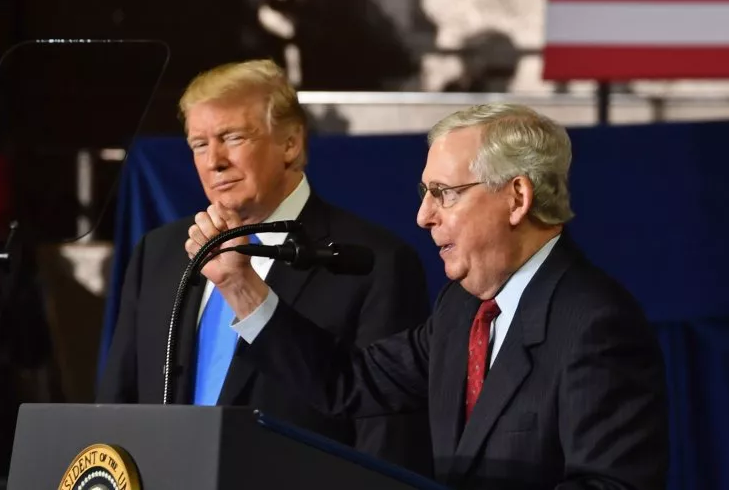After instituting a $1.5 trillion tax cut and signing off on a $675
billion budget for the Department of Defense, Senate Majority Leader
Mitch McConnell said Tuesday that the only way to lower the record-high
federal deficit would be to cut entitlement programs like Medicare,
Medicaid and Social Security."It's disappointing, but it's not a
Republican problem," McConnell said of the deficit, which grew 17
percent to $779 billion in fiscal year 2018. McConnell explained to
Bloomberg that "it's a bipartisan problem: Unwillingness to address the
real drivers of the debt by doing anything to adjust those programs to
the demographics of America in the future." The deficit has increased 77
percent since McConnell became majority leader in 2015.New
Treasury Department analysis on Monday revealed that corporate tax cuts
had a significant impact on the deficit this year. Federal revenue rose
by 0.04 percent in 2018, a nearly 100 percent decrease on last year's
1.5 percent. In fiscal year 2018, tax receipts on corporate income fell
to $205 billion from $297 billion in 2017.
Senate Majority Leader Mitch McConnell speaks as
President Donald Trump looks on during a 'Make
America Great Again' rally at Eastern Kentucky
University, in Richmond, Kentucky, on October
13.
The deficit has increased 77 percent since
McConnell became majority
leader in 2015.
NICHOLAS KAMM/AFP/Getty Images
Still, McConnell insisted that the change had nothing to do with a
lack of revenue or increased spending and instead was due to entitlement
and welfare programs. The debt, he said, was very "disturbing" and
driven by "the three big entitlement programs that are very popular,
Medicare, Social Security and Medicaid.… There's been a bipartisan
reluctance to tackle entitlement changes because of the popularity of
those programs. Hopefully, at some point here, we'll get serious about
this."President Donald Trump promised to leave Medicare untouched
on the campaign trail, but Republican leaders like House Speaker Paul
Ryan and Florida Senator Marco Rubio have long indicated their desire to
cut entitlement programs to pay for their tax cuts."You have got to generate economic growth because growth generates
revenue," Rubio said at a Politico conference late last year. "But you
also have to bring spending under control. And not discretionary
spending. That isn't the driver of our debt. The driver of our debt is
the structure of Social Security and Medicare for future beneficiaries.""We're
going to have to get back next year at entitlement reform, which is how
you tackle the debt and the deficit," Speaker Ryan said on a
conservative radio program around the same time.Democrats, meanwhile, jumped on McConnell's admission as proof that
Republicans had long planned to cut entitlement spending to fund the tax
cuts that largely benefit corporations and wealthy Americans. "The
truth comes out! This was their deceptive plan all along," said
Representative Lois Frankel of Florida."When Republicans in
Congress said their tax cuts to wealthy multinational corporations would
pay for themselves, they lied," wrote Ohio Congressman Tim Ryan on
Twitter. "Now, they're going to try to come for hardworking people to
foot the bill by slashing Medicare, Medicaid, and Social Security. We
can't let them."A recent Pew poll found that the majority of both
Democrats and Republicans thought the rising federal deficit and cost
of health care were major problems facing the U.S.—something that
Democrats are taking note of and will try to package into their midterm
campaign platforms over the next three weeks."Every Republican
Senate candidate is on the hook for Mitch McConnell's plan to cut
Medicare and Social Security. First it was jeopardizing pre-existing
conditions coverage, then it was pursuing an age tax that would charge
older Americans more for care, and now it's targeting the benefits
Americans have paid into," wrote Democratic Senatorial Campaign
Committee spokesman David Bergstein in a statement. "This platform is
disqualifying, and just like taking away coverage for pre-existing
conditions, it's exactly what GOP candidates don't want to be talking
about weeks before the election."


